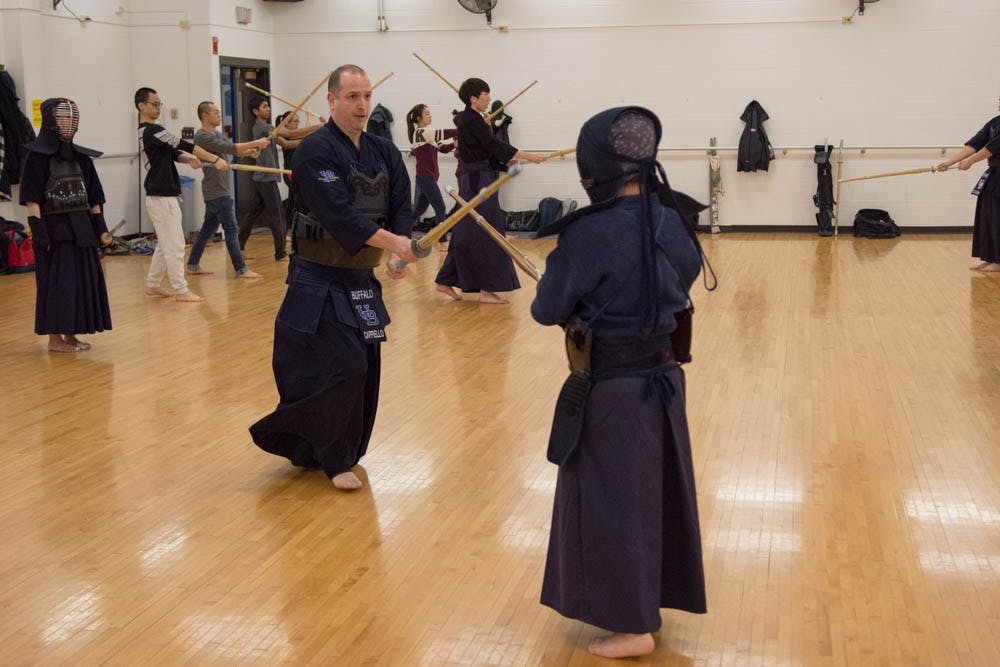The hollow sound of wood strikes echo through Alumni Arena. Intense shouting, like that of a Japanese samurai movie, can be heard as you approach Triple Gym.
Alumni room 75 is an unfamiliar world, one filled with respect, duty and honor.
UB’s Kendo club, often referred to as Japanese fencing, is one of the most unique clubs at UB. At first glance, it appears disorganized and chaotic, but the club is rooted deeply in tradition and discipline.
“It is not as much sports heavy as it is tradition heavy, as opposed to [other combat sports like] Olympic fencing,” said Brandon Lee Chin, a chemical engineer graduate student and former president of the UB Kendo club.
Kendo follows traditional Japanese culture. In Japan, the teachings of Kendo are established at a young age. The sport teaches respect, honor, courage and self-discipline.
These teachings go beyond Kendo and affect the everyday lives of those who play.
“Mentally, you make straight forward decisions, you’re less indecisive, you have more respect for others and have more empathy,” Chin said.
In a Kendo tournament, there are three judges. To score a point you must hit one of three points: the head, body or hand. The specifics of the attacks in the sport make focus essential.
“When you first start Kendo, you’re going to get hit for sure and be focused on how not to get hit,” said Wilson Wang, a junior math major and president of the Kendo club. “You should focus on hitting instead.”
Another major element of Kendo is to remain emotionless. Taunting an opponent is a sign of disrespect, showing exhaustion is a sign of weakness and showing happiness dishonors one’s opponent.
“To withhold emotion is a part of Japanese culture. In Japan culture, you should think of the other person first. So by celebrating, your win will make the loser feel bad.” Sensei Samuel Cappiello, a financial advisor who devotes six to eight hours a week to Kendo, said. “Same thing applies to showing pain. If your opponent misses the target and hits your elbow and you react to the pain, he will feel bad for missing.”
Cappiello started UB’s Kendo club 13 years ago. He has been practicing Kendo for 25 years and decided to bring such a pivotal part of his life to UB.
“All my friends are Kendo players and the reason I met my wife was due to Kendo,” Cappiello said. “Kendo helps me stay focused and mentally calm… It has taught me to be able to succeed through adversity and become a more balanced person. Without Kendo in my life, I am sure I would have been a much different person.”
Cappiello brings what he learns in Japan back to teach his students at UB.
Kendo is different from other martial arts. It is a mental sport that takes a lot of personal strength in order to get better.
“Kendo is a martial art, but different from all others. It is 80 percent mental even though it has physical aspects,” Wang said. “It is like a sport, it has important things like manner and discipline, which is what is important in Kendo.”
In Kendo, spirit is when a person shows emotion. It may sound simple, but it is essential in the game.
While making a hit, a person must simultaneously show spirit. Without spirit, a strike is pointless.
“A lot of people are very quiet and Kendo is the opposite of that,” Chin said. “You want to show your spirit, you don’t want to be a coward.”
The Kendo club meets Tuesdays and Thursdays from 8 p.m. to 10 p.m. in Alumni Arena 75 across from the triple gym.
Jeremy Torres is a staff writer and can be reached at sports@ubspectrum.com





